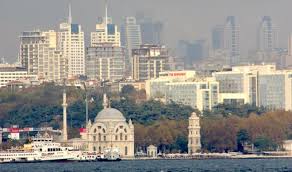Superficially,
the heart of Istanbul, the beautiful city rich in history that sits along the
Bosphorus, is hanging on – barely. The hideous tsunami of concrete skyscrapers ruining the classic silhouette of
the famous city encroaches from all sides with every passing day. The drive
from the airport to the city used to be one of the most beautiful anywhere. You
had the sea on one side and well-laid-out flower beds on the other. Now, it’s
like driving down a dark tunnel with no view of anything.
Worse
than the aesthetic and historical damage are the barely suppressed anger, fear,
resignation, depression among the at least 49% who voted against the
constitutional changes giving President Tayyip Erdoğan total control. Convinced
that victory was stolen from them by complete fraud the opponents of Erdoğan’s
power grab are thrashing around trying to come up with an effective response.
The one heartening note for the NO voters is that Erdoğan lost all the major
cities, including previously solid Erdoğan districts in Istanbul. Perhaps this
development will form the basis for a serious challenge to Erdoğan in the next
election. But never underestimate the ability of the opposition to shoot itself
in both feet.
After
changing the election rules while the vote was being counted the High Election
Commission has been proven to be completely useless. The courts are no better.
Essentially there are no genuinely independent institutions or internationally
recognized law in Turkey.
Some
have given up and already moved to Europe or the United States. Many of these
wisely got EU or American passports several years ago. According to Greek
reports more than 200 Turkish citizens have boosted the Greek real estate
market by buying houses and flats there.
As
one Turkish friend with a brand new Athenian apartment put it, “Tsipras is a
loose cannon, but he is tightly controlled by the EU. There is nothing at all
controlling Erdoğan. He is flat out dangerous.”
Other
wealthy Turks now spend their holidays in Greece’s garden spots like Spetses,
or Porto Heli. The attractions of Greece extend beyond tourism, however. One
major Turkish company is having its annual senior management retreat at the
Grand Bretagne Hotel in Athens. One of Turkey’s leading groups, the Doğuş
Group, has made major investments in Greece by purchasing the Athens Hilton, joining
the partnership in the redevelopment of the Astir Palace, and buying five
marinas. This is just part of a trend where Turkish companies are investing
outside Turkey at much faster rate than inside Turkey.
Still
others are very concerned about their children’s education, and are looking all
over Europe and the U.S. for schools. “This government wants to produce a
generation of morons with frontal lobotomies that simply accepts everything by
rote, never questions anything and certainly never criticizes anything. My kids deserve more." As if to confirm this fear the government recently banned the internet encyclopedia Wikipedia because it contained information that was insufficiently pro-
Meanwhile,
the Turkish economy continues its dangerous downward slide. Inflation and
unemployment continue to raise despite government spokesmen laughingly saying
the problem is ‘under control.’ The
only way the government can secure funds for the public works projects that
feed Erdoğan’s close circle of friends and family is the increasing resort to
Treasury guarantees – guarantees that cover everything from revenue from
public/private projects and debt held by the contractors of these projects,
some of the private bank debt issued to exporters and small/medium sized
businesses. There is even talk of making the state the payer of last resort for
mandated severances payments that companies must pay each employee according to
seniority when they leave. In order to save cash and make the books look
better, many companies don’t set aside enough money for these payments. Now the
government is considering if it should bail the companies out and assume these
payments. One Turkish investment banker in London laughed when discussing these guarantees. "It's the perfect set-up. There is absolutely no way for one of the favored contractors or concessionaires to lose money. This government will make sure they get bailed out regardless of the hit to the Treasury."
The most troubling part of all these guarantees is that there is absolutely
no transparency. No one, certainly not the hapless taxpayer, has any idea of
the details of this potential serious hit to the Turkish treasury and
ultimately to his wallet. But, then again, why would you make these deals
transparent if that very transparency would undermine the fantasy that you are
trying to get the Turkish people to believe?
However,
before people start thinking that any looming economic collapse will shake
Erdoğan’s throne they should recall some other countries where dictators have
not been affected by weak economies.
“Think
about places like Zimbabwe, Russia, North Korea and Venezuela. All these
economies are suffering and the ordinary people are in tough straits. The
ruling clique stays in power by throwing the democratic rule book out the
window and making its friends rich. Essentially the people are stuffed.”
Despite
all the turmoil and disappointment one young NO voter estimates that most of
his fellow NO voters will hunker down and try to make the best of a bad
situation. Family ties, professional lives and a strong loyalty toward a vision
of what Turkey could be will keep
them in their native country, and perhaps form the core of resistance to
turning Turkey into just another 3rd world dictatorship. One can
hope.





